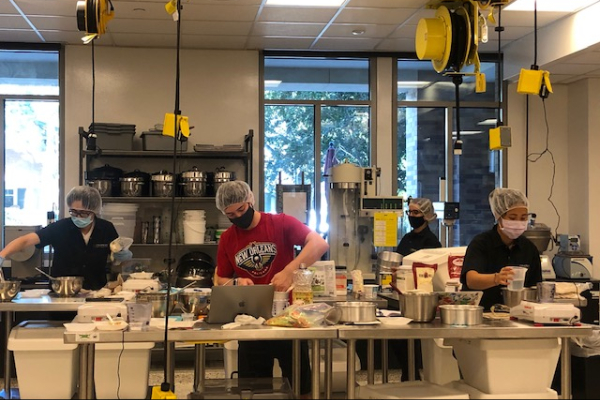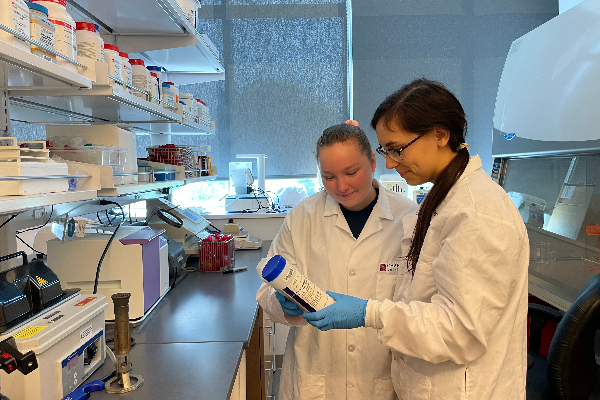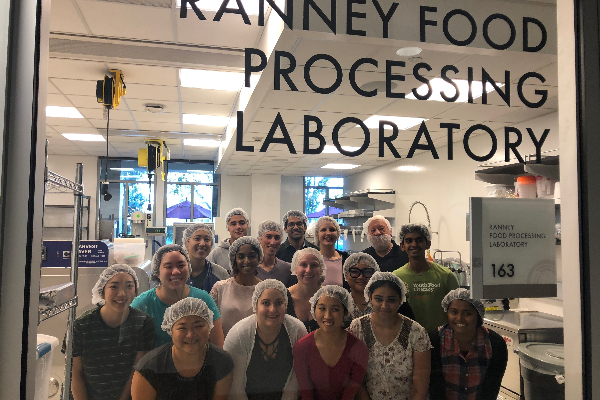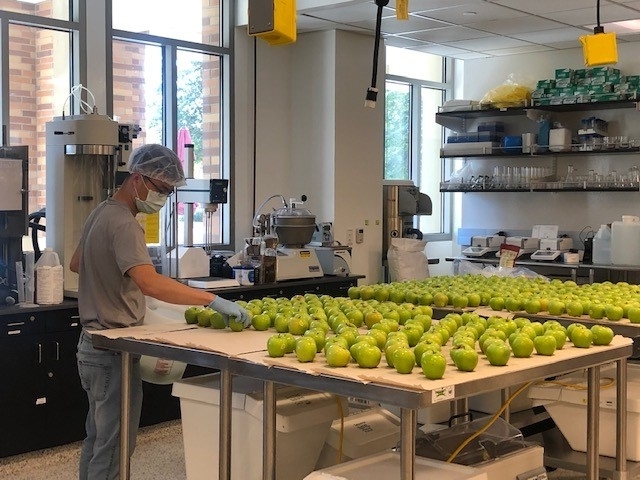»Master of Science in Food Science
Chapman University’s Master of Science in Food Science program will help turn your passion, knowledge and experience with the science of food into a rewarding career. As a student of the Food Science program, you will apply scientific principles to study the properties of food and develop innovative ways to process and package foods, resulting in safe, sustainable and nutritious food choices.
Why Pursue a Master’s in Food Science?
- The demand for food scientists is projected to increase 7% through 2026*.
- Job prospects in Southern California are especially strong because industry-leading companies are well represented in the region.
- The food industry is economically stable and full of rewarding careers.
MS in Food Science Program Highlights
- Convenient evening classes for working adults.
- Excellent graduate and alumni career and internship placement rates.
- Choose an emphasis in Food Safety and Regulatory or Product Development and Sensory Evaluation.
- Receive support applying for a USDA National Needs Fellowship which will allow you to gain expertise addressing areas of shortage such as food science and human nutrition.
Our Students and Alumni
Some of the employers who have hired graduates with a degree in Food Science from Chapman University include:
- Chipotle
- Disney
- General Mills
- Impossible Foods
- Mars
- Starbucks
- Taco Bell
- And many more!
Upcoming Events
Master of Science in Food Science Virtual Information Session
Career and Internship Opportunities
Today, food science represents one of the healthiest industries in the world, with the various food industries – from processing to sales – contributing close to $42.2 billion to our national economy. With over 1,500 food-processing companies within a 90-minute drive of campus, Orange County is the ideal location for food science careers and internship opportunities. Take a look at the recent Economic Impact of Food and Beverage Processing in California report prepared for the California League of Food Processors. For the latest industry employment information, view the IFT Employment and Salary Survey Report.
Most of our students obtain work experience via internships, and our job placement rate is close to 100%. Graduates of our program have gone on to work for:
- Amway
- Arbonne
- Bonduelle
- Chipotle
- Disney Consumer Products
- General Mills
- Golden West Foods
- Hershey
- Impossible Foods
- Jack in the Box
- Liquid IV
- Mars
- Nutrilite
- Panda Restaurant Group
- Peet's Coffee
- See's Candies
- Sprout's
- Starbucks Corporate Headquarters
- Taco Bell Corporate Headquarters
- Thrive Market
- Trader Joe's Corporate Headquarters
- Unilever
- Whole Foods
- And many more...
Graduate students also readily gain admission into graduate programs of their choice, including medical school. The program is also beneficial for students who are about to attain medical or dental degrees, as they can complete the food science coursework in the same year that they are applying to medical school and taking exams.
Admission Requirements
Prerequisite Courses
Recently admitted applicants hold degrees in chemistry, biology, pharmacy, business, chemical and mechanical engineering as well as food science and nutrition. We encourage applicants from a broad range of disciplinary interests, as long as you have completed the following coursework:
- General Chemistry with Laboratory (two semesters)
- Organic Chemistry with Laboratory (two semesters or one semester organic and one semester biochemistry)
- Microbiology with Laboratory (one semester)
- Statistics (one semester)
- Human Nutrition (one semester)
Any of these courses can be completed at other accredited institutions such as your local community college and/or other four-year colleges and universities. If you have not completed some of your prerequisite course/s prior to applying, it is possible to enroll in these courses at Chapman University. However, in order for your application to be considered for review, you are required to have successfully completed one year (two semesters) of General Chemistry with Laboratory. All other prerequisites must be met by the end of the first academic year. Please contact us for more information.
Application Deadlines
Priority review deadlines for fellowships and scholarships are:
- November 1 for Spring admission
- May 1 for Fall admission.
Applications received after this date will be considered on a rolling basis as space is available.
Application Requirements
- Online application for admission (including $60 non-refundable application fee)
- Official transcript from degree granting institution. If prerequisite courses have been taken at schools other than the degree granting institution, those transcripts must also be submitted.
- Applicants must have earned a minimum grade point average of 3.00.
- An interview is required for all applicants.
- Submission of Graduate Record Exam (GRE) or Graduate Management Admission Test (GMAT) scores is optional for the M.S. Food Science program. The GRE or GMAT is required for consideration to the Joint MS/MBA program (GRE school code is 4047).
- Letters of recommendation; two letters of recommendation are required which describe your professional and academic abilities
- Statement of Intent; an essay addressing your reasons for wishing to attend Chapman University and the M.S. Food Science program
- Resume; a resume or curriculum vitae is required
- Language Test (International Students Only) – applicants who have completed their undergraduate degree outside of the United States are required to achieve the following minimum score on Test of English as a Foreign Language (TOEFL):94, International English Language Testing System (IELTS):7, Pearson Test of English (PTE):76 or Cambridge English Advanced Exam (CAE): C1
- International Supplement Form (International students only)
Prerequisites
Degrees and Emphases
Degrees offered
- MS in Food Science (34 units)
- MS in Food Science with emphasis in Food Safety and Regulatory (40 units)
- MS in Food Science with emphasis in Product Development and Sensory Evaluation (40 units)
- MS in Food Science/MBA Joint program (69 units)
- Integrated Undergraduate/Master of Science in Food Science
About Food Science with emphasis degrees
MS in Food Science with emphasis in Food Safety and Regulatory (40 units)
Following the passage of the Food Safety Modernization Act (FSMA) in 2011, there has been an increased focus on food safety and regulations within the food industry.
Learning outcomes of the emphasis
- Identify specific hazards associated with a range of food matrices and assess how each hazard can be prevented, controlled, and/or mitigated in the food production system.
- Apply knowledge of hazards to develop and audit food quality and safety assurance systems. Understand regulatory compliance of food product development, manufacturing, labeling, and marketing of food products and apply them to real-world situations.
- See the Graduate Course Catalog for more information
MS in Food Science with emphasis in Product Development and Sensory Evaluation (40 units)
In order to develop new food products for consumers, companies rely on project teams that include experts in product development, sensory evaluation, and marketing. Individuals working in these areas are also expected to have expertise in food ingredients and functional foods.
Learning outcomes of the emphasis
- Apply core food science knowledge to develop new products and solve food industry problems.
- Enable students to function as key members of multifunctional product development teams in the workplace.
- Apply knowledge of sensory evaluation to the establishment and management of sensory evaluation panels, projects and programs.
- See the Graduate Course Catalog for more information
Integrated Undergraduate/Master Programs
The food science program offers an integrated program that enables undergraduate students to begin taking M.S. coursework in their junior or senior year and receive a Master of Science in Food Science in as little as one year after finishing their undergraduate degree. The program is open to all undergraduate majors as long as they have satisfied the prerequisites for the program and meet admission requirements.
Chapman students can apply to a graduate program in their junior or senior year. Students will receive conditional admission to the program, pending completion of their bachelor's degree as stipulated in the graduate catalog (see explanation of conditional admission in the graduate catalog). If accepted into a graduate program, undergraduate students may take up to 15 graduate credits once they have completed 90 undergraduate credits. These 15 credits may also count towards their undergraduate degree credit requirement. Students would complete the remaining credit hours of graduate coursework beginning in the semester after receiving the undergraduate degree. The application process, prerequisites, GPA and graduate program requirements are as specified for the M.S. in Food Science; however letters of recommendation are waived.
- Integrated BS Biology/M.S. Food Science
- Integrated BS Chemistry/M.S. Food Science
- Integrated BS Biochemistry/M.S. Food Science
- Integrated BS Health Sciences/M.S. Food Science
Nutrition Minor
Students in the Nutrition Minor learn about the evidence that informs dietary guidelines and clinical nutrition practice, recognize misconceptions regarding nutrition, identify gaps between current knowledge and marketing of food products, garner an appreciation for nutrition across the lifespan, examine contemporary international nutrition and food sustainability issues, and explore concepts in nutritional biochemistry relating to human metabolism and chronic disease states.Unless enrolling in 3 credits of an approved independent research study or internship, students will need to successfully complete FSN 303 at least one full year in advance of planned graduation. Please contact Nutrition Minor advisor Dr. John Miklavcic for more information.
Please see the undergraduate course catalog for more information about declaring a minor.
Learning Outcomes
- Knowledge of core food science concepts.
- Demonstrate mastery of core concepts in food chemistry and analysis, food safety and microbiology, and food processing and engineering.
- Demonstrate a clear understanding of the factors that impact the safety, quality, and nutritional value of foods.
- Critical thinking.
- Through individual research projects, students will apply the scientific method to solve problems in food science.
- Students will be able to effectively evaluate and critique professional papers and reports in the field of food science and nutrition.
- Communication.
- Students will be able to communicate scientific and technical knowledge in food science to professional audiences using written, visual, and oral means.
- Problem Solving.
- Students will function effectively in the food and allied industries to solve practical, real world problems.
Alumni & Friends
Welcome to the Chapman Food Science Alumni & Friends page
Here you'll find links to areas of interest and as well as happenings in our program and Chapman at large. We love our alumni, and hope you'll keep in touch. If you're not receiving the tri-annual Food Science Alumni Newsletter, please take a moment to update your contact information, and let us know if you'd like to mentor a current student. We promise that this information will never be shared!
Upcoming Events!
- Better Process Control School: Chapman University's Better Process Control School (BPCS) provides low acid and acidified food processing classes for food science professionals. The acidified and aseptic packed foods course is a two day workshop, and the low-acid food course is a four-day workshop. Participants who earn a passing grade on each chapter exam will be awarded a Certificate of Completion that indicates satisfactory completion of FDA and USDA-FSIS training requirements.
Connect to other alumni & current students!
Join the Panther Network (TPN)! This new resource fosters meaningful connections, professional/career development and inclusive mentoring. Similar to LinkedIn in concept, this new, exclusive online community is for Chapman alumni and students.With a simple search, you can connect to just fellow Food Science alumni, and alumni in other fields, as well as current students. If you've already created your profile, thanks! If not, please take a few moments and check it out. Let me know what you think!
Join the "closed" Chapman Student & Alumni Facebook page to connect with other alumni, get information about events, post or look for jobs, and more!
Register your thesis in the Leatherby Libraries!
Share your research with current students by registering it on the Leatherby Libraries Digital Commons. It's easy and will contribute to the Food Science archives.
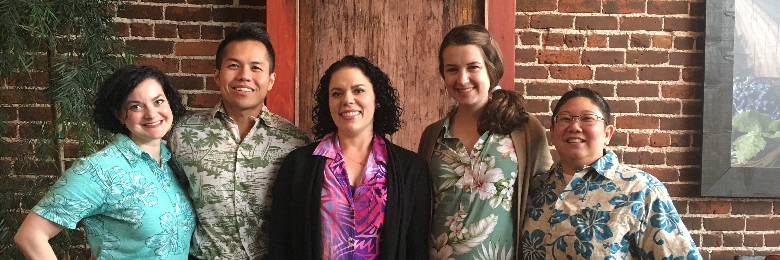
FAQs
APPLICATION
What is the GRE and is it required?
The GRE is a general, standard exam for graduate-level admissions testing verbal reasoning, quantitative reasoning, and analytical writing (note: GRE school code for Chapman is 4047). The GRE is not a requirement for admission into the Food Science program.
Who should my letters of recommendation come from? May I submit additional letters?
Letters of recommendation should come from former faculty members or those you've worked with in the food industry who can attest to your academic and professional abilities.
What are the application deadlines?
Generally, 5/1 for Fall admission & 11/1 for Spring admission; however we will consider applications after these deadlines for qualified students.
What factors are included in the application evaluation?
GPA from the undergraduate degree, personal interview, letters of recommendation, statement of intent, resumes (language test for international applicants).
Can I submit my application before I have all the necessary documents?
Yes! Admissions will hold your application and notify us as your documents become
available. You will not receive an admissions decision, however, until all
documents have been received.
STUDENT LIFE
Are there any student clubs/organizations?
Food Science students are automatically members the Food Science Student Association. Check out the Facebook, Instagram and LinkedIn pages for all the latest Food Science Student Association happenings. Students in our program are encouraged to join the professional organizations for Food Scientists: the Institute of Food Technologists (IFT) as well as the Southern California Institute of Food Technologists (SCIFTS).
What are the housing options?
On-campus housing is extremely limited and graduate students are encouraged to research alternative living arrangements off-campus by visiting our Introduction to Off-Campus Living page. You can also connect to our community through our Facebook Off Campus Housing and Roommate Corner page.
How accessible are the professors at Chapman?
With a small student to professor ratio (most classes have less than 20 students), Food Science students have incredible access in this highly personalized program.
Does Chapman offer part-time enrollment and evening classes?
Because many of our Food Science students work or hold internships in the industry, most of our classes are offered in the late afternoons & evenings. Many students attend part-time.
What Student Resources are available?
We welcome a diverse student population with a variety of needs, and Chapman University has resources available for all our students. Check our what's available on the Schmid College Diversity, Equity and Inclusion webpage!
SCHOLARSHIPS, INTERNSHIPS, AND RESEARCH OPPORTUNITIES
Does your program offer scholarships or financial aid? Limited merit-based scholarships are awarded by the Food Science program for outstanding
applicants, as funding is available. Students are evaluated at the time of application
(no separate application is necessary). We recommend completing the FAFSA for Financial
Aid. Check out the Financial Aid website for more information.
What research opportunities are there? Students have amazing opportunities for collaboration with Faculty in many compelling areas. Check out the Faculty Members section in the drop-down above for more information! There is no need to secure a faculty advisor before being admitted.
What internship opportunities are there?
Because the Chapman Food Science program & faculty have close ties with the industry, students often receive excellent internship opportunities.
FOR INTERNATIONAL STUDENTS
Where can one learn more about student visa and other requirements for International students?
There is helpful information available on the International Graduate Student Admission page, including the Cost of Attendance for International Graduate Students.
Are Chapman's Food Science students eligible for STEM benefits?
Yes, students in our program are eligible to apply for STEM (Science, Technology, Engineering & Math) benefits. See the International Student & Scholar Services page for more information, or contact Pavis Ortega, at iss@chapman.edu or (657) 304-3126.
What is OPT?
Optional Practical Training, or OPT, allows international students to work in the United States for three years (for STEM fields), following graduation, in a job related to one's major field of study. See the International Student & Scholar Services page for more information.
What is CPT?
Curricular Practical Training allows one to participate in an off-campus paid internship
that is related to the student's major or field of study. More information
can be found at International Student & Scholar Services.
- Ms Food Science
- Master of Science in Food Science
- MS in Food Science Faculty
- Joint MS Food Science / MBA
- Food Science Program - Better Process Control School College of Science and Technology
- Ranney Food Processing Lab
- USDA National Needs Fellowship Program
- USDA Fellowship Application
- SURFFS-UP Fellowships
- The Science and Technology of RTD Coffee with Milk
CONTACT US
Robyne Kelly, MPA
Graduate Program Manager
rokelly@chapman.edu
(714) 289-2040
Keck Center Room 147
Shannon Morris Alvarez, MA
Graduate Admissions Counselor, DSO
shannona@chapman.edu
(714) 997-6711
Graduate Financial Aid
gradfinaid@chapman.edu
(714) 628-2730
Application Deadlines
Priority review deadlines for fellowships and scholarships are:
November 1 for Spring admission
May 1 for Fall admission
Applications received after this date will be considered on a rolling basis as space is available.
